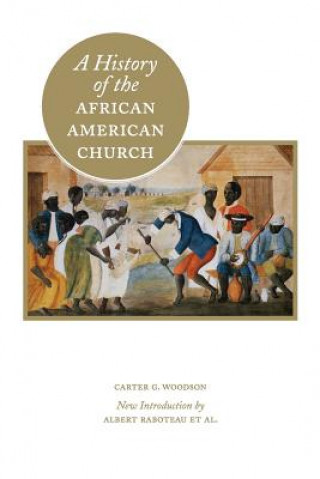
Kód: 08885744
History of the African American Church
Autor Carter G Woodson
Carter G. Woodson's classic text on the emergence of African American churches, chronicling their story out of the eighteenth-century evangelical revivals and their transformations through the nineteenth and early twentieth centur ... celý popis
- Jazyk:
 Angličtina
Angličtina - Vazba: Brožovaná
- Počet stran: 208
Nakladatelství: Diasporic Africa Press, 2013
- Více informací o knize

Mohlo by se vám také líbit
-

Dune
216 Kč -

Haunting Adeline
621 Kč -

Berserk Deluxe Volume 2
1092 Kč -

White Nights
89 Kč -

Powerless
268 Kč -

Atomic Habits
330 Kč -

Dune Messiah
228 Kč -

Berserk Deluxe Volume 3
1142 Kč -

One Day
221 Kč -

Berserk Deluxe Volume 1
1115 Kč -

Iron Flame
368 Kč -

Surrounded by Idiots
213 Kč -

Harry Potter and the Prisoner of Azkaban (Minalima Edition)
993 Kč -

Gravity Falls Journal 3
443 Kč -

Heaven Official's Blessing: Tian Guan Ci Fu (Novel) Vol. 1
372 Kč -

The Creative Act
568 Kč -

Dune
276 Kč -

Hunting Adeline
624 Kč -

A Little Life
290 Kč -

Children of Dune
230 Kč -

Heaven Official's Blessing: Tian Guan Ci Fu (Novel) Vol. 2
427 Kč
Darujte tuto knihu ještě dnes
- Objednejte knihu a zvolte Zaslat jako dárek.
- Obratem obdržíte darovací poukaz na knihu, který můžete ihned předat obdarovanému.
- Knihu zašleme na adresu obdarovaného, o nic se nestaráte.
Více informací o knize History of the African American Church
Nákupem získáte 58 bodů
 Anotace knihy
Anotace knihy
Carter G. Woodson's classic text on the emergence of African American churches, chronicling their story out of the eighteenth-century evangelical revivals and their transformations through the nineteenth and early twentieth century, is important for reasons other than "black church" history. With the exception of recent books, such as C. Eric Lincoln and Lawrence H. Mamiya's "The Black Church in the African-American Experience," Woodson's text remains one of the best overviews of the topic. But Woodson's text is also a significant account of the ways in which Christian-based instruction and socialization shaped not only class divisions and vetted leadership among, but also shaped who/what became the "Negro/Colored/Black/African American." For even the "Father of Black History," as Woodson is often called, could not escape the spell casted by the prevailing Christian ideology of his time, and in the earlier periods he investigated. In fact, Woodson viewed "Christianity [as] a rather difficult religion for [the] undeveloped mind [of the enslaved African] to grasp," and never questioned this Christianity or probed the African basis of rituals and ideas among the enslaved and the emancipated. Instead, Woodson extols the virtues of Christianity among the converted, and the men who established the various churches in African descended communities, including the educative, social, economic, and political roles played by these institutions after the U. S. Civil War. There is little here about those who adhered to spiritual or religious practices and ideas that remained as close to Africa as possible. For Woodson, then, the ministry was one of the highest callings and occupations to which African American male leaders could aspire, and from which they accrued prominence within their communities at a time when religious instruction was the primary schooling option available. These "educated Negroes," as Woodson called them, were now armed with the Christian religion, Christian names, and a dream to partner (in an inferior position) with the dominant values and views of white society, which all created sectarianism and, eventually, two divergent visions among African descended peoples in North America. Nineteenth century converts split along "class" lines, and urbanized elites developed a Christian distaste for their kinfolk who continued to engage in African-based rituals and practices, such as the ring shout. By the first quarter of the nineteenth century, these elites began to seek equal rights and full acceptance by whites-thus the need to distance themselves from things "African" and despite the fact that a few church organizations kept the term "African" as part of their name. The majority of the African-based community saw racism and its insidiousness as deeply rooted in their fight for human rights, while the elites viewed slavery and discrimination as obstacles which prevented "their" particular progress rather than a collective advancement. Since Woodson, writing in the first quarter of the twentieth century, had access to individuals who were either enslaved or children of the enslaved, his account is still therefore relevant as both a source and as a story that captures some of the foregoing processes in African and African American history.
 Parametry knihy
Parametry knihy
Zařazení knihy Knihy v angličtině Humanities Religion & beliefs Religion: general
582 Kč
- Plný název: History of the African American Church
- Autor: Carter G Woodson
- Jazyk:
 Angličtina
Angličtina - Vazba: Brožovaná
- Počet stran: 208
- EAN: 9781937306052
- ISBN: 9781937306052
- ID: 08885744
- Nakladatelství: Diasporic Africa Press
- Hmotnost: 286 g
- Rozměry: 229 × 152 × 11 mm
- Datum vydání: 01. September 2013
Osobní odběr Praha, Brno a 12903 dalších
Copyright ©2008-24 nejlevnejsi-knihy.cz Všechna práva vyhrazenaSoukromíCookies



 Vrácení do měsíce
Vrácení do měsíce 571 999 099 (8-15.30h)
571 999 099 (8-15.30h)